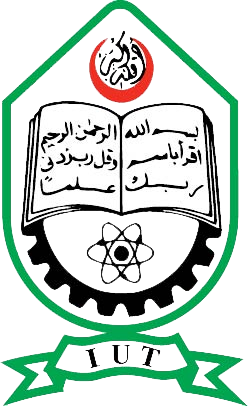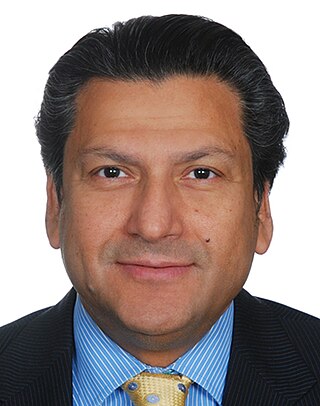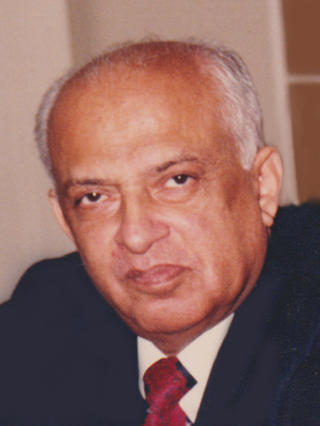Related Research Articles

Bahria University is a public-sector university established in 2000 by the Pakistan Navy at Shangrilla Road, Sector E-8/1 in Islamabad, Pakistan. The university maintains campuses in Karachi, Islamabad and Lahore.

Muzaffar Iqbāl is a Pakistani-Canadian Islamic scholar and author.

Islamic University of Technology, commonly known as IUT, is an international engineering technological research university located in Gazipur. IUT offers undergraduate and graduate programs in engineering and technical education.

Atta-ur-Rahman, h-index 75, with 36,000 citations is a Pakistani organic chemist and is currently serving as Professor Emeritus at the International Center for Chemical and Biological Sciences at the University of Karachi and as Chairman of PM Task Force on Science and Technology. He has twice served as the President of Pakistan Academy of Sciences. He was the Federal Minister of Science and Technology (2000-2002), Federal Minister of Education (2002) and Chairman Higher Education Commission with status of Federal Minister (2002-2008) He is also the President of the Network of Academies of Sciences in Countries of the Organisation of Islamic Countries (NASIC). After returning to Pakistan from Cambridge after completing his tenure as Fellow of Kings College, Cambridge University, he contributed to the development of the International Center for Chemical and Biological Sciences at the University of Karachi, and transforming the landscape of higher education, science and technology of Pakistan. He is Fellow of Royal Society (London), Life Fellow of Kings College, Cambridge University, UK.,, Academician Chinese Academy of Sciences and Professor Emeritus at University of Karachi
Usmanu Danfodiyo University, Sokoto (UDUS), also known as UDUSOK, is a public research university located in the city of Sokoto, north western Part of Nigeria. It is one of the initial twelve universities founded in Nigeria by the federal government in 1975.
Anwar Nasim is a Pakistani molecular biologist and geneticist who was the president of Pakistan Academy of Sciences from 2015–2017. He currently resides in Toronto, Canada.

Shahid Kamal is a retired Pakistani career diplomat. Over his career, he worked in the Ministry of Foreign Affairs; Prime Minister’s Office, United Nations, Organization of Islamic Cooperation (OIC) and Pakistani diplomatic missions in Paris, New York, Washington, Stockholm and Berlin.
Tariq Rahman is a Pakistani academic scholar, newspaper columnist, researcher, and a writer.

Pakistan continues to enjoy a privileged status in the Organisation of Islamic Cooperation. In terms of population, it is the OIC's second largest member. Pakistan is the only Muslim country to have detonated nuclear weapons, has the sixth-largest standing military force in the world and a large labour workforce working in various Muslim countries.
Naeem Ahmad Khan, FPAS, was a Pakistani nuclear physicist and a professor of physics who was known for his work in developing techniques using the solid-state nuclear track detector and solid-state nuclear magnetic resonance. Although he worked with the Government of Pakistan for most of his career, he also taught physics at a number of Pakistani universities and was the civilian scientist of the Pakistan Air Force (PAF) until his death.

Mumtaz Ali Kazi, popularly known as M.A. Kazi, was one of Pakistan's leading scientists and educators. He was President of the Pakistan Academy of Sciences from 1978 to 1988 and President of the Chemical Society of Pakistan from 1977 to 1990.
References
- ↑ "Standing Committees". Organisation of Islamic Cooperation. 1975-07-15. Retrieved 2022-02-03.
- 1 2 Midrar ullah, Librarian and Literature Search Officer Army Medical College (Jan–Jul 2007). "Medical Library Cooperation: a necessity". Rawal Medical Journal. 32 (1). ISSN 0303-5212. Archived from the original on 2010-12-08. Retrieved 2009-11-24.
- ↑ Associated Press of Pakistan (2009). "Comstech starts networking of 45 OIC libraries". Business Recorder. Archived from the original on 2011-09-28. Retrieved 2009-11-24.
- ↑ "List of Participating Libraries". COMSTECH.[ permanent dead link ]
- ↑ "Regional Information Center for Science and Technology and The Organization of Islamic Conference (OIC) Standing Committee on Scientific and Technological Cooperation (COMSTECH)". Regional Information Center for Science & Technology.